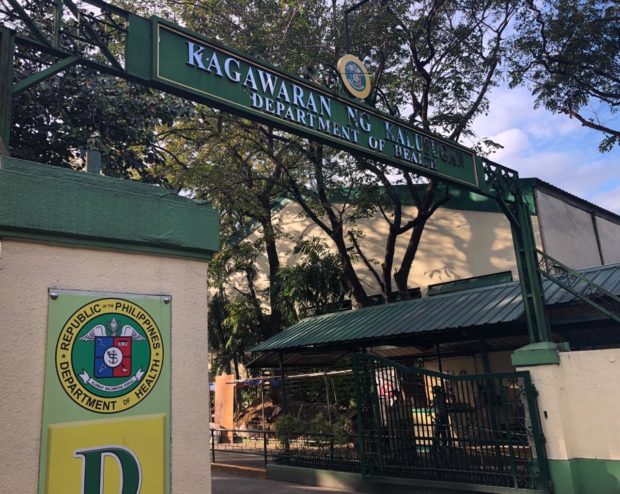PH groups note US think tank article on foreign ‘meddling’ in local tobacco policies

Facade of the DOH main office in Manila. INQUIRER.net file photo
MANILA, Philippines — The Nicotine Consumers Union of the Philippines (NCUP) and the Philippine E-cigarette Industry Association (PECIA) called attention on Tuesday to an article by a US-based think tank supposedly “exposing” the “meddling” of Bloomberg Philanthropies, an organization of billionaire Michael Bloomberg, in the tobacco policies of low and middle-income countries, including the Philippines.
In a statement issued on Tuesday, the groups said the article should “serve as a wake-up call” for the Philippine government.
The article, written by Michelle Minton, is titled “Exposed: Bloomberg’s Anti-Tobacco Meddling in Developing Countries.” It was published on June 15 on the blog of the Competitive Enterprise Institute (CEI), a US-based think tank.
The article cites a 128-page document, leaked by an anonymous source, that details the Campaign for Tobacco-Free Kids (CTFK) of Bloomberg Philanthropies.
The NCUP and PECIA statement quoted one part of the article that involves the Philippines:
Article continues after this advertisement“In the Philippines, it [the campaign] describes efforts ‘to file and push a smoke-free bill’ aimed at blocking tobacco industry representatives from being part of the policy process, further noting that such a bill ‘has been drafted and will be filed as soon as the opportunity is ripe.’”
Article continues after this advertisementAnton Israel, president of NCUP, said: “The document proved that Bloomberg Philanthropies and the many organizations it is supporting had been funding government agencies in the country in exchange for anti-tobacco and anti-vaping policies and are depriving the rights of 16 million Filipino smokers and 1 million users of smoke-free nicotine products.”
“Worse, they make it appear that it is okay to influence national policies. But this meddling recently backfired when the Department of Health, in its eagerness to enforce Bloomberg’s policies, refused to use the life-saving respirators donated by tobacco companies at the height of the health crisis,” Israel added.
Joey Dulay, president of PECIA, said that instead of relying on the advice of foreign NGOs, the government should listen to Filipino consumers directly affected by these policies.
The NCUP and PECIA have repeatedly been questioning the influence on Philippine tobacco policies of The Union, which is funded by the anti-tobacco organization Bloomberg Initiative.
Recently, the House of Representatives, the groups’ statement noted, conducted an investigation to determine whether the Food and Drug Administration (FDA) issued specific and pre-defined policies on e-cigarettes and heated tobacco products in exchange for funding from The Union, which is funded by the anti-tobacco organization Bloomberg Initiative, a part of Bloomberg Philanthropies.
During one of the hearings, Puwersa ng Bayaning Atleta Party List Rep. Jericho Nograles revealed that several government agencies, including the FDA, the Department of Health (DOH), the Commission on Civil Service (CSC), and the Metropolitan Manila Development Authority, had received a total of $2.5 million from The Union beginning in 2009.
“There have been multiple instances wherein every time there is an anti-tobacco regulation that comes out of either the FDA or DOH, it coincides with grants coming from Bloomberg,” Nograles said.
One issuance that the NCUP and PECIA are questioning is the controversial Joint Memorandum Circular 2010-01 by the DOH and the CSC.
This, they said, was cited as the basis for a draft regulation barring tobacco companies and other industries access to COVID-19 vaccines through the government’s tripartite agreement.
The same circular was also cited as a basis in refusing acceptance of the much-needed respirators donated by the
tobacco industry.
The JMC was signed by then-CSC chief and now DOH Secretary Francisco Duque III prohibiting government interaction with the tobacco industry.
The groups recalled that CSC Commissioner Aileen Lourdes Lizada had moved to recall what she described as a “defective” JMC.
She noted that there was no record in the CSC that granted Duque authority to sign the JMC on behalf of the CSC, which acts as a collegial body.
During the Senate hearing on National COVID-19 Vaccination Program, Senate Minority Leader Franklin Drilon questioned Duque about the JMC and asked to have it reviewed by the Department of Justice.
Referring to the refusal of the donated respirators, Drilon told Duque: “There is absolutely no basis for you to take this action. It is an overreach on the part of the DOH to reject such a donation simply because it came from a tobacco company. I do hope that this JMC is submitted and reviewed by DOJ.”